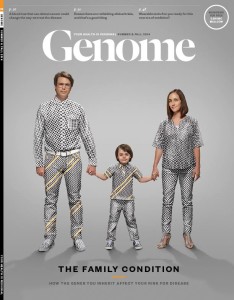
Spring/Fall 2014 Issue
Alzheimer’s disease might provide one of the best opportunities to understand how people cope with unsettling genetic news, says Robert Green, a neurologist and medical geneticist at Harvard Medical School.
“It’s just about the scariest disease that you can think of, and there’s no treatment,” he says. “It’s sort of the worst case scenario for anxiety and stress.”
Green has been involved in a series of studies, part of a research effort dubbed REVEAL (Risk Evaluation and Education for Alzheimer’s Disease), looking at the psychological and practical ripple effects of testing positive for APOE4, a risk factor for late-onset Alzheimer’s. It turns out that the participants, who have a parent with the disease but no symptoms themselves, handle a positive finding relatively well. “They are unhappy,” Green says. “But they do not have catastrophic reactions.”
Read the full article at Genome Magazine »
Genome Magazine‘s mission is to explore the world of personalized medicine and the genomic revolution that makes it possible, empowering you to make informed health decisions that will help you live better and longer.
